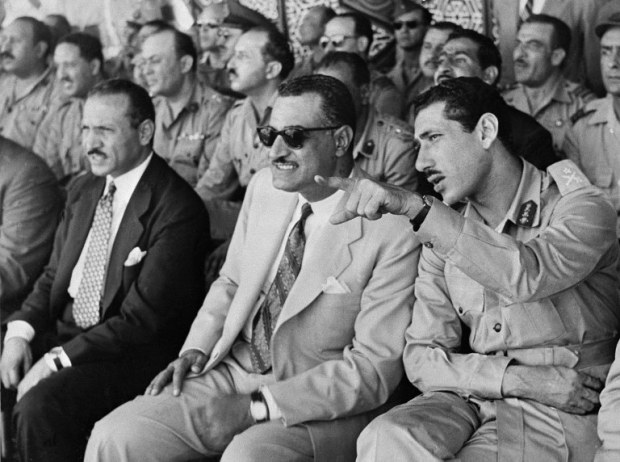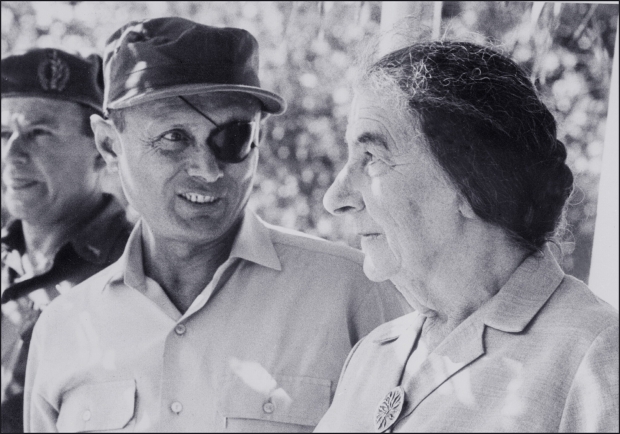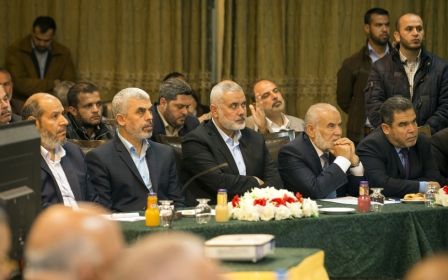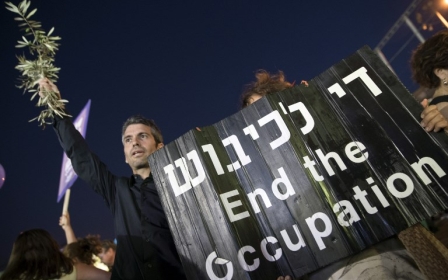1967 War: How a euphoric Israeli victory turned into a nightmare

Today marks the 50th anniversary of the 1967 War, the fateful battle in which Israelis then believed the survival of their nation hung in the balance. In a few short days that followed, a lighting victory against three Arab states brought about a nationalist, almost messianic fervour following the conquest and occupation of the West Bank and Gaza, and its four million inhabitants. This led, in turn, to the founding of the Greater Israel movement and the launching of settlements which today involve nearly 700,000 Israeli Jews currently living on Palestinian lands in violation of international law.
The prevailing narrative at the time and for decades thereafter was: Israel was a hearty David surrounded by powerful Arab armies intent on annihilating it. The bellicose Egyptian tyrant Gamal Abdel Nasser’s haranguing speeches threatening war confirmed this intent. And when he closed the Strait of Tiran in May 1967 and demanded that UN peacekeepers leave the Sinai, war was all but guaranteed. According to this Israeli account, the Arabs were bent on “throwing the Jews into the sea,” thus making it a war of necessity and one of existential consequence for the nation.
'We must be honest with ourselves. We decided to attack him [Nasser]'
- Menachem Begin
The truth is quite different. No less a nationalist figure than future prime minister Menachem Begin said: “In June 1967, we had a choice. The Egyptian army concentrations in the Sinai approaches do not prove that Nasser was really about to attack us. We must be honest with ourselves. We decided to attack him.”
Israeli forces were far better prepared and equipped for war than the Arabs. Though Nasser threatened war, he had done nothing to protect his air force from attack: a sure sign that he hadn’t intended to do so.
Israel’s leadership had, for well over a decade, tried to undermine or overthrow Nasser, whom it viewed as a threatening Arab nationalist firebrand, one who led the non-aligned nations against Western colonial domination. In 1956, Ben Gurion had plotted with Britain and France to attack Nasser and wrest control of the Suez Canal from him. After their initial victory, only US President Dwight Eisenhower’s angry denunciation of the invasion brought the plotting to a halt and forced the return of Egyptian territory.
Censored reporting of Israeli war crimes
The Israeli army’s treatment of Egyptian prisoners during the six days of war and the period following is also scarcely reported. Because its strategy depended on a surprise attack and a mad dash across Egyptian Sinai, Israeli forces had no capacity for tending to the tens, or even hundreds of thousands of enemy soldiers who were left in the rear.
One of the methods Israel used to deal with the Egyptian prisoners was rounding them up and killing them en masse
With little provision for tending to prisoners or transporting them to prisoner of war camps, one of the methods Israel used to deal with the Egyptians was rounding them up and killing them en masse. Some historians of the war estimate that as many as 10,000 Egyptian soldiers may have been murdered after they surrendered.
Author and journalist James Bamford’s Body of Secrets claims that the Israeli air force attacked the USS Liberty on 8 June 1967 because it had monitored communications traffic proving Israel had slaughtered 1,000 prisoners at El Arish. Separately, the Israeli Defense Forces (IDF) even employed units to drive through the desert searching for and killing stragglers they found.
These events were suppressed by Israel’s military censors for obvious reasons. Even the most famous contemporary account compiled by Israeli soldiers themselves, Siach Lohamim (The Seventh Day in English), eliminated such accounts offered by the soldier-witnesses themselves. I reported on the infamous Ras Sudr massacre here.
Push for nuclear weapons
Another important aspect of Israel’s military plan has been censored for this entire 50-year period. Only in recent days, Israel’s leading nuclear historian, Avner Cohen, revealed that its generals created a fail-safe provision, known as the Samson Option, in case Israel was losing the war.
Moshe Dayan urged prime minister Golda Meir to consider a demonstration of a nuclear weapon to deter invading Arab armies
In order to prevent annihilation, its scientists rushed to complete the state’s first nuclear weapon. It would be detonated, if necessary, on a mountain in the Sinai. This would strike terror into the advancing Arab armies, making them realise that, if they continued, Israel might use similar weapons directly against them. Alternatively, such a demonstration might force the US to intervene to forestall Israeli defeat.
The IDF officer in charge of this operation, Brig Gen Yitzhak “Yatza” Yaakov, believed to his dying day that Israel should have launched the demonstration regardless of the war’s outcome, in order to intimidate the Arab states and force them to be compliant to Israeli demands.
He revealed this hitherto secret information to Cohen around 2000, then spoke to Israeli investigative reporter Ronen Bergman, who sought to publish it in Yediot Ahronot. The military censor objected, killed the article, and accused Bergman of “espionage” for attempting to reveal the information.
Later in 1973, when Israel faced mounting losses in the initial stages of the October War, defence minister Moshe Dayan urged prime minister Golda Meir to consider a similar demonstration of a nuclear weapon to deter invading Arab armies.
The origins of occupation
There have been scores of articles, commentary and analysis published in publications throughout the world meditating on the meaning of the anniversary of the war in 1967 and the impact the occupation has had on Israel. Many of these reports adopt a conventional liberal Zionist critique bemoaning the occupation and its impact on Israeli society. They adopt a nostalgic “if only” tone: if only Israel hadn’t turned right and turned left instead. If only Israel’s leaders had renounced conquest and used the territory they conquered to offer peace to their neighbours.
It was in 1948 and thereafter that the seeds of apartheid were planted, which ripened into full bloom in 1967
They view 1967 as a fateful event which saddled Israel with the albatross of occupation. The national enthusiasm over the conquest eventually became a poison pill. If only Israel could end this dreadful occupation, then finally it could be a normal nation like all others.
These analyses ignore the fact that the choices Israel made in 1967 were practically sealed in amber as a result of decisions made by Israel’s founders in 1948 and thereafter. That was when Ben Gurion ordered the expulsion of some one million Palestinian indigenous inhabitants. It was the beginning of 20 years of military rule over the remaining Palestinians citizens. It was when Israel determined that its non-Jewish citizens would be second-class citizens with subordinate rights to Jewish citizens. It was in 1948 and thereafter that the seeds of apartheid were planted, which ripened into full bloom in 1967.
Before and after
Most Israelis tend to see Israeli history through the prism of two watershed moments: the 1948 War (War of Independence) and the 1967 War (Six-Day War). The first ensured the survival of the new state, but left it vulnerable and its legitimacy in question. Though Israel achieved military success in this first major military encounter with its Arab neighbours, and vastly expanded the territory the United Nations mandate would have allotted to it, it did not offer secure, defensible borders (in the eyes of these Israelis), nor did it achieve a permanent peace with the frontline states.
It was only after 1967 that Israelis truly felt there was a sense of permanence and solidity to their enterprise
The 1967 War changed all that. Israelis saw it as a miraculous victory that ensured Israel’s permanence in the region. It forced the Arabs to concede that the state was no longer a temporary presence or interloper, but rather a force to be reckoned with. For that reason, most Israelis tend to think of these two periods as “before” and “after”. Before 1967, Israel was in formation, an experiment gradually taking shape. It was only after 1967 that Israelis truly felt there was a sense of permanence and solidity to their enterprise.
Israel’s rule over the four million Palestinians under occupation is a direct extension of the military rule of Israeli Palestinians from 1948 to 1966. The former today live under precisely the same sort of military administration imposed on Israeli Palestinians then. They are subject to military, rather than civilian justice. Draconian administrative detention procedures permit arrest and indefinite imprisonment without trial. It means the loss of the right to an attorney and even the potential for torture.
Thus, allowing the remaining businesses which are above water to disentangle themselves from the albatross and flourish. This saddles the shareholders of the failing businesses with all the responsibility and liabilities, while having no real power to regain what they’ve lost.
The two-state shibboleth
Since the 1980s, a consensus developed among Israeli liberals and their supporters in America and elsewhere, that the most equitable way to resolve the Israeli-Palestinian conflict was with a two-state solution. The outlines of such a compromise involved Israeli retreat from most of the Occupied Territories, a shared capital for two states in Jerusalem, and a token acknowledgement by Israel of the right of return of Palestinian refugees.
For the past 35 years, the two-state mantra has been repeated endlessly as if it was a talisman. It’s watershed moment was the 1993 Oslo Agreement, by which the two parties agreed to a five-year provisional period during which they would lay the groundwork for two states. By 1999, Israel was to withdraw and Palestine was to come into being.
But a “funny thing” happened on the way to two-states: Yitzhak Rabin was assassinated by a settler fanatic in 1995, Hamas launched a bitter series of suicide bombings, and Rabin’s successor, Shimon Peres, botched the opportunity to lead Israel to peace. As a result, Bibi Netanyahu came to power in 1996, and Oslo was effectively dead, though few recognised this at the time.
That marked the beginning of the embalming process for the two-state solution. Ever since, peace talks may have been based on the two-state premise, but no Israeli leader has been willing to make the compromises necessary to achieve it.
Status quo over two-states
Despite protestations to the contrary, Israel vastly prefers the status quo. It enables the “Jewish state” to retain its Jewish majority. Economically, Israel has thrived (though it likely would have performed even better had there been a full peace). The occupation, though it has cost tens of billions of dollars, has been mitigated by the largesse of US foreign and military aid.
And finally, the Palestinians under occupation have been relegated to backwater status. Even those Palestinians who have resisted have never been able to mount a serious military or diplomatic challenge to Israeli hegemony.
Instead of blaming Israelis or Palestinians for the decades-long impasse, we in the West must look ourselves in the mirror
Even international mass activism like the Boycott Divestment Sanctions movement, while showing some signs of success, has not yet proven a significant threat to Israel.
Writing in his new book, The Only Language They Understand, Nathan Thrall suggests a different approach: instead of blaming Israelis or Palestinians for the decades-long impasse, we in the West must look ourselves in the mirror. It is the lassitude of the US and Western nations who have aided and abetted Israel’s rejectionism, which is the main culprit. They must come together in a concerted, decisive effort to break the cycle.
Thrall argues that the only way to peace is by imposing a settlement on the parties. And the way to do this is by implementing (or threatening to implement) harsh measures that would bring Israel to heel. These would include economic sanctions both on the Israeli government and all businesses whose existence is dependent on international trade. Other methods might include cutting off foreign and military aid and a weapons embargo, if necessary.
While few progressives reading this would disagree with the provisions of Thrall’s plan, the key question is how to get there. The Israel lobby is possibly the most powerful powerhouse in American politics. It manages to squelch even the most minor forms of resistance to Israel’s wishes. It holds even US presidents politically hostage.
Even a genuine progressive candidate like Senator Bernie Sanders had to tone down his pro-Palestinian views and rhetoric considerably during the Democratic primaries in order to make himself palatable to the lobby and its supporters.
If even Sanders can be cowed by the lobby, how would Thrall propose to pressure US and European governments to develop the sort of unity that led to international sanctions against Iran? Yes, it is true that while BDS appears to be gradually gaining traction and the lobby appears to be gradually losing some of its steam. Polls of Americans and American Jews indicate that Israel faces increasing indifference or opposition.
But how long will it take before these phenomena push any American government to do the right thing regarding Israel-Palestine? And is there enough time left before this powder-keg blows sky-high through some sort of accident or major miscalculation? Will it take an episode of mass slaughter on the scale of Rwanda or Srebrenica to wreck the equanimity of the world and compel it to take action?
- Richard Silverstein writes the Tikun Olam blog, devoted to exposing the excesses of the Israeli national security state. His work has appeared in Haaretz, the Forward, the Seattle Times and the Los Angeles Times. He contributed to the essay collection devoted to the 2006 Lebanon war, A Time to Speak Out (Verso) and has another essay in the upcoming collection, Israel and Palestine: Alternate Perspectives on Statehood (Rowman & Littlefield).
The views expressed in this article belong to the author and do not necessarily reflect the editorial policy of Middle East Eye.
Photo: A mirage "Vautour" flying over Israeli soldiers sitting on tanks in the Sinai peninsula on the Israel-Egypt border. In six days in 1967, Egypt's vaunted airforce was destroyed and its army humbled. Egyptians never overcame the shock of that defeat to Israel that spelled the end of their country's regional dominance (AFP)
New MEE newsletter: Jerusalem Dispatch
Sign up to get the latest insights and analysis on Israel-Palestine, alongside Turkey Unpacked and other MEE newsletters
Middle East Eye delivers independent and unrivalled coverage and analysis of the Middle East, North Africa and beyond. To learn more about republishing this content and the associated fees, please fill out this form. More about MEE can be found here.









